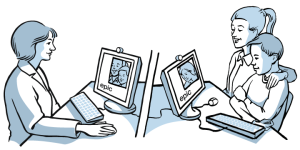Teletherapy at Dream River
 In our increasingly digitally connected world, and during the COVID experience, we’re using new ways to connect. Dream River Counseling has incorporated the power of digital connection to help more people access the support they need. We have offered Teletherapy, also known as Telehealth, Online Therapy, or Video Therapy, for 4 years.
In our increasingly digitally connected world, and during the COVID experience, we’re using new ways to connect. Dream River Counseling has incorporated the power of digital connection to help more people access the support they need. We have offered Teletherapy, also known as Telehealth, Online Therapy, or Video Therapy, for 4 years.
Teletherapy is delivered through a virtual platform via a computer. If you’ve ever used FaceTime, Zoom or Skype, it’s essentially the same thing – except more secure and with a qualified therapist or counselor at the other end instead of a distant friend or relative. Dream River Counseling has a confidential Teletherapy services build right into our client portal. There is also a secure app for your mobile devices as well.
Dream River Counseling Teletherapy services are approved by the Health Insurance Portability and Accountability Act of 1996 (HIPAA). This is legislation that ensures data privacy and security for safeguarding medical information, including therapy.
Teletherapy is beneficial for a range of people, for a diverse set mental health therapy services. Teletherapy sessions work much the same way as traditional therapy sessions with only one significant difference – the therapist and the client are not in the same room.
Sessions are scheduled at an appropriate and suitable time and day for each party, who then log-in through our secure video platform within the client portal or app. The therapist and client can see and hear each other in real-time during the session via the use of webcams and audio microphones built into to your computer or mobile device. Through this virtual environment, you can interact with the therapist, who uses the same traditional techniques and activities we would use in a face-to-face therapy session.
Therapists at Dream River Counseling are ethically and legally bound by privacy laws to not share details about their Teletherapy sessions with third parties, just as with face-to-face sessions. Therapists must ensure they are in a private and secure room before engaging in any Teletherapy sessions. Sessions should not be recorded or shared, unless with explicit agreement from the patient.
From the patient end, it is also down to them to ensure they conduct their end of the session in an equally private area to ensure their confidentiality.
Some therapists have argued that Teletherapy is more private than traditional face-to-face sessions, where patients who know each other have the potential to bump into each other on the premises where therapy takes place.